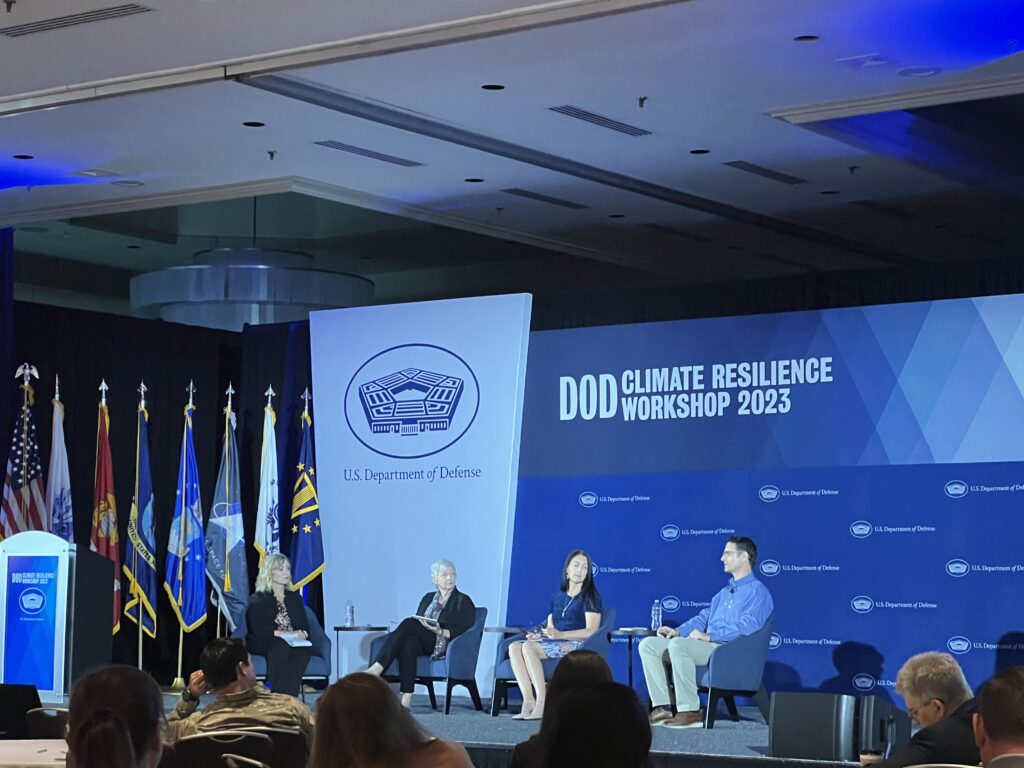
In July 2023, the U.S. Department of Defense (DoD) hosted its’ first ever Climate Resilience Workshop in St. Louis, Missouri. Convening military installation commanders, base planning and engineering staff, state and local officials, federal grantmaking agencies, environmental and economic resilience research and advocacy groups, and regional development organizations, this conference was unique in showcasing a distinct niche of planning work: military installation resilience. In centering military operational readiness within wider community issues like climate resilience, hazard mitigation, transportation planning and economic development, the DoD Readiness and Environmental Protection and Integration program (REPI) and the Office of Local Defense Community Cooperation program (OLDCC) are taking realistic and proactive region-led approaches to military installation planning.
Andrew Coker, NADO Research Foundation Regional Development Researcher, attended the workshop and met with leadership from several EDDs in attendance.
Regional collaboration and building planning partnerships were at the forefront of the workshop. With sessions such as Partnering to Develop Resilient Infrastructure, which promoted the value of installation-community partnerships on utility infrastructure projects, to sessions like Regional Installation Resilience Approaches, where regional organizations presented on their efforts to support installation’s response to climate change, the workshop’s message was clear: no community or installation can work alone, and the regional model is ideal as region’s and installation’s work to address climate resilience.
Military installations are, often times, one of the biggest economic drivers for their surrounding communities. Further supporting these installations and their operational readiness and mission sustainability, is a vital piece of regional economic development work. As in many areas of EDD work, different EDDs take different approaches to work in their communities. Some EDDs have long-established collaborative planning and administration relationships with their local installations, while others have struggled to make in-roads with their local installations.
NADO Research Foundation is beginning to explore the military planning space and provide resources, guidance, and trainings to EDDs on how to best manage and grow relationships with their local military installations.
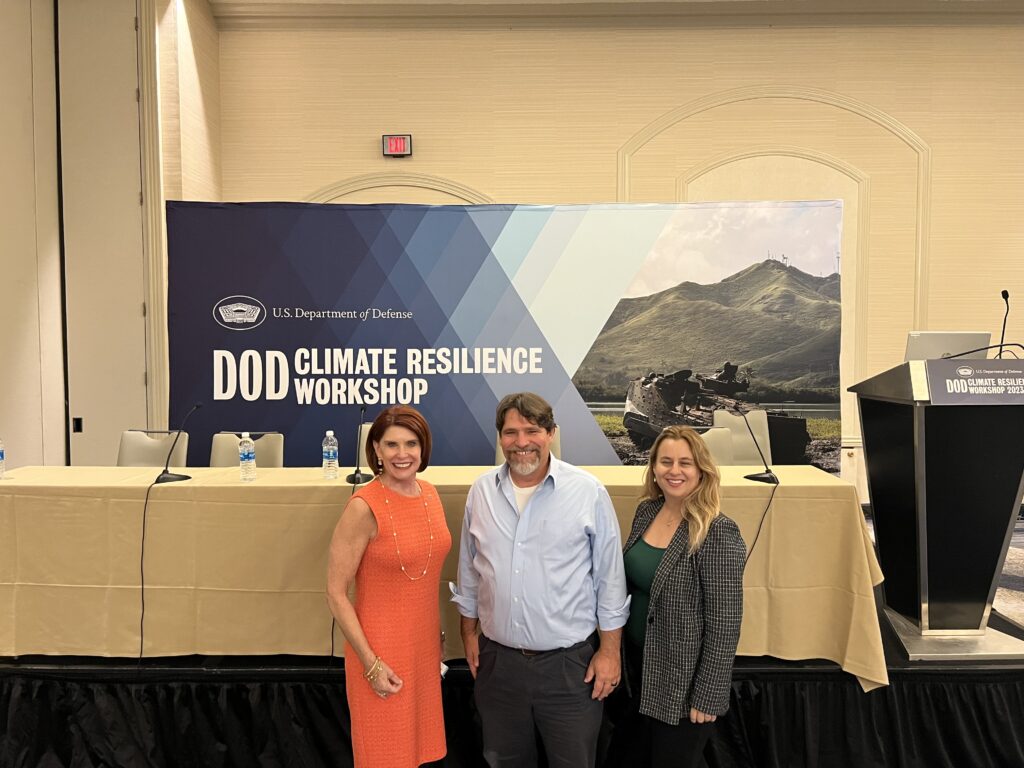
EDDs were well represented at the inaugural DoD Climate Resilience Workshop by (left to right) Diane Rath, Executive Director at Alamo Area Council of Governments, Jim Livingston, Executive Director at River Valley Council of Governments in western Georgia, and Christina Miskis, Principal Planner at South Florida Regional Planning Council.
1. The regional model is ideal for addressing the large-scale issues facing communities with military installations. Regional labor shed analyses, environmental and compatible use studies, and traffic and commute pattern mapping show that installations impact several cities and counties across a given region. EDDs best fit into this space as a unifying and consensus-building voice of their member cities and counties. If your region has a military installation and you don’t have an existing relationship with base command or leadership, reach out and build this planning and synergistic relationship.
A great resource for civilians interacting with the military is the Best Practices and Guidance for Engaging with Military Installations for Climate Resilience in Defense Communities, produced by the University of Georgia Marine Extension and Georgia Sea Grant, in partnership with the Southeast Regional Partnership for Planning and Sustainability and the REPI program.
2. Military installations undergo substantial planning processes including Joint Land Use Studies (JLUS), Compatible Use Studies, and Military Installation Resilience Reviews (MIRR) in partnership with OLDCC. If they don’t already, EDDs are encouraged to reach out to your local military installation to see how the EDD can support these planning efforts.
Several EDDs and MPOs around the country complete both military plans and regional CEDS, hazard mitigation, and transportation plans for their communities. Having all of these planning processes under one roof creates planning synergy opportunities through data sharing, joint public engagement opportunities, and allows for greater plan integration between member communities. Aligning and integrating these military planning processes with your other regional plans is key to ensuring efficient and implementable projects down the road.
3. Climate resilience and hazard mitigation planning are improved by the regional model. Geographic and jurisdictional boundaries at the city or county level can lead to plan siloing and fragmented, incomplete solutions to the identified issues. Regionalization of planning processes allows for modeling, data collection and analysis, and scenario planning that all use the same standardized set of data. This standardization allows regions to then prioritize solutions and compare how communities are impacted by certain hazards or risks in an apples-to-apples way. EDDs are the ideal organization to regionalize and standardize these complex, multi-jurisdictional planning processes.
4. Hazard mitigation and climate resilience planning must be done on the systems level to be effective. The Infrastructure Planning and Resilience Framework (IRPF) developed by the Cybersecurity and Infrastructure Security Agency is a great resource for taking planning efforts to the regional and systemic level. The IRPF is meant for communities to analyze existing dependencies and risks within their infrastructure systems. Green River Area Development District (GRADD) in Kentucky recently used this model to conduct their CEDS and regional hazard mitigation planning processes with great success. This planning framework is easily transferable to the military installation planning realm. To learn more from GRADD staff, check out this tip sheet featuring Colie Smith, Regional Resiliency Coordinator at GRADD.
5. Climate resilience is a great opportunity for regions to address equity and environmental justice issues affecting their communities. Underserved communities have often been subjected to dangerous environmental conditions in past planning and can be the first impacted by changing climatic effects. The New Growth Innovation Network’s recent publication, the Elevating Equity in Economic Development: An Inclusive Recovery Toolkit shows how EDDs can build trust and deliver results for underserved communities in their regions.
6. Climate resilience is not just a Gulf Coast or western states’ drought issue. Whether it is dangerous wet bulb temperature spikes sustaining over several days or weeks in Southeast and Midwest regions or volatile storm patterns that are increasing flood risks in the Northeast, every region in the U.S. is now being impacted in some way by climate change. Identifying and understanding how your region is impacted are the first steps to mitigating potential hazards.
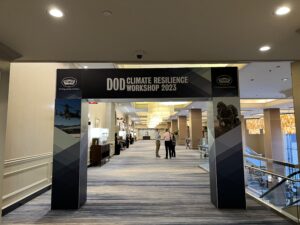
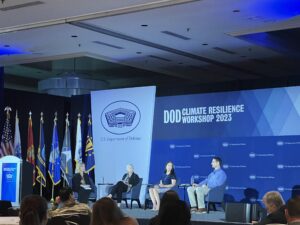
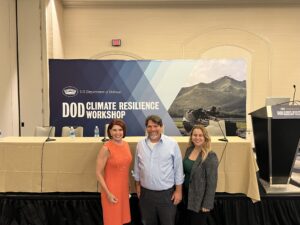
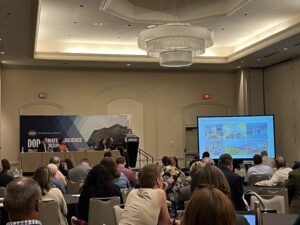
 The EDD CoP is funded through an award from the U.S. Economic Development Administration, U.S. Department of Commerce (ED22HDQ3070106). The statements, findings, conclusions, and recommendations above are those of the participants, trainers, and authors and do not necessarily reflect the views of the U.S. Economic Development Administration or the U.S. Department of Commerce.
The EDD CoP is funded through an award from the U.S. Economic Development Administration, U.S. Department of Commerce (ED22HDQ3070106). The statements, findings, conclusions, and recommendations above are those of the participants, trainers, and authors and do not necessarily reflect the views of the U.S. Economic Development Administration or the U.S. Department of Commerce.
© 2022 National Association of Development Organizations (NADO) and the NADO Research Foundation. All Rights Reserved.
Regional Development Researcher Andrew Coker joined the NADO team in March of 2023 after spending two and a half years as the Regional Economic Resiliency Coordinator at West Central Arkansas Planning and Development District. Andrew holds a bachelor’s degree from Hendrix College and a master’s degree from the University of Arkansas Clinton School of Public Service.
At NADO, Andrew conducts research on the newest economic and community development best practices from Economic Development Districts across the country. He helps produce easily digestible information on complex regional issues through case studies, tip sheets, and research reports. Andrew also hosts training and professional development opportunities including conference sessions and virtual webinars for member regional development organizations.
Andrew is one of our Missouri-based team members and enjoys reading and training for his next triathlon.
Jack Morgan came to the NADO team in 2022 after seven years with the National Association of Counties (NACo) as a Program and Senior Program Manager. Prior to NACo, Jack was a Policy Analyst for Friends of Southwest Virginia. Jack holds a bachelor’s in geography from Emory & Henry College and a master’s in geography from Appalachian State University.
As a NADO Senior Program Manager, Jack leads capacity-building and peer-learning work supporting energy communities in economic transition, regional resilience, and recreation economies. He also helps with the EDA-Austin training program Emerging Leaders.
Jack is certified by the American Institute of Certified Planners (AICP) and is a member of the American Planning Association (APA) in the Regional & Intergovernmental Planning division. He also serves on the Emory & Henry College Alumni Board.
Taking road trips, reading non-fiction, and indulging in top-notch barbecue and coffee round out Jack’s days. He loves maps, mountains, and of course, all things sports.
Karron Grant joined the NADO team in 2023 as Administrative Specialist and is the first face (or voice) you’ll see or hear when reaching out to NADO. As Administrative Specialist, Karron manages our database and coordinates NADO event operations. He ensures members’ needs are met, contact information stays current, and NADO’s office is running efficiently.
Karron came to NADO after four years in the classroom teaching at The New Century School and Old Mill Middle North where he received the Patriot of the Year award. He attended Towson University and the University of Maryland Global Campus and holds a bachelor’s in international studies and humanities.
Visiting art galleries and museums, playing basketball and bowling, and taking in movies and music are some of Karron’s interests and hobbies.
Deputy Executive Director Laurie Thompson has been with NADO for 25 years. Laurie helps keep the NADO and NADO Research Foundation wheels turning through management of the daily operations of the Research Foundation, securing financial resources and overseeing grants management, and helping execute NADO’s Annual Training Conference each year.
Laurie holds a bachelor’s in public affairs and government from Mount Vernon College and a master’s in health services administration from The George Washington University. Prior to NADO, Laurie spent time as a Field Specialist and an Eagle Staff Fund Director at First Nations Development Institute.
When she’s taking a rare reprieve from her NADO work, Laurie enjoys traveling domestically and internationally to visit friends and family.
Jamie McCormick joined the NADO team as a Policy Fellow first in 2019, then moved into her current role as Legislative Associate in 2021. As Legislative Associate, Jamie keeps NADO members apprised of any policy and regulatory issues and communicates NADO’s policy priorities to federal stakeholders and partner organizations. She is also the first stop for members with inquiries on policy issues. The planning and execution of NADO & DDAA’s annual Washington Conference is also managed by Jamie.
Jamie holds a dual bachelor’s in political science and international relations from The State University of New York College at Geneseo and a master’s in international development studies from The George Washington University. In addition to her roles at NADO, Jamie also worked as a Legislative Assistant for the Northeastern Retail Lumber Association.
Outside of her NADO work, Jamie is an active volunteer with the VOLO Kids Foundation and a fundraiser for YMCA youth programs. She is also NADO’s resident baker regularly providing treats for those in NADO’s D.C. office. Traveling, taking her pup on walks, and hiking in the northeast keep Jamie busy.
Brett Schwartz began at NADO in 2012 as a Research Fellow after earning his J.D. from the University of Baltimore School of Law. The following year, he was promoted to Program Manager and has now been leading as an Associate Director since 2018. Brett is responsible for managing NADO’s Economic Development District Community of Practice (EDD CoP), as well as researching and monitoring the latest trends in regional economic development and resilience, including best practices for the Comprehensive Economic Development Strategy (CEDS). With more than a decade of experience on the NADO team, Brett is a dynamic relationship builder helping connect and build capacity among the national network of regional development organizations.
Brett also holds a bachelor’s degree from Georgetown University and a master’s from Trinity College Dublin, as well as a certificate in mediation training. He’s a member of Catalyst Grantmakers of San Diego and Imperial Counties and was a participant in the 2021-22 Field Trips to the Future Cohort.
Brett is one of NADO’s West Coast team members residing in San Diego, CA where he enjoys spending time outdoors, attending concerts and festivals, and soaking up life as a parent of two young children.
Communications Manager Katie Allison joined the team in 2023 to lead the strategic communication efforts of NADO. Katie creates and develops print and online materials, communicates NADO’s updates to members via weekly emails, and maintains content for nado.org and NADO’s social media channels. She also works with different departments to generate new ideas and strategies to effectively describe and promote the important work NADO is doing for EDDs and RDOs across the country.
An experienced nonprofit communications professional, Katie has worked for organizations in western North Carolina for nearly a decade. She holds a bachelor’s in communications from Wingate University where she was a four-year student athlete. Katie has also completed Vision Henderson County, a comprehensive leadership development program that promotes informed and committed civic volunteerism.
Katie stays busy trying to keep up with her two young sons whom she enjoys exploring the Blue Ridge Mountains with. Traveling to new and favorite places and cheering on the Atlanta Braves are some of her family’s favorite pastimes.
Senior Program Manager Ciara Ristig has been a member of the NADO team since 2021, and helps with NADO’s EDD Community of Practice, EDD staff capacity building and other grants on a range of subjects, including equity and solar energy. Before NADO, Ciara worked as a Planner for the County of Santa Barbara and an Assistant Project Manager for REM Consult. Ciara holds a bachelor’s in urban studies and French from Bryn Mawr and a master’s in urban studies from Ecole d’Urbanisme de Paris.
When she’s not traveling, you can find her outrigger paddling and serving on the board of the Blue Sky Center in New Cuyama, CA, near her home base of Santa Barbara.
Carrie Kissel has been a member of the NADO team since 2005 when she began as a Research Fellow. She later moved into the roles of Program Manager in 2006, and then Associate Director in 2011. Carrie holds a bachelor’s in anthropology from Ball State University and a master’s in public anthropology from American University. As Associate Director, Carrie oversees NADO’s work in rural transportation and rural wealth creation. She provides technical assistance and support to rural regions on transportation and economic development issues and develops training and peer exchange events on transportation issues and rural wealth creation as an economic development strategy.
Carrie is a member of the Transportation Research Board (TRB) and secretary of TRB’s Rural Transportation Issues Coordinating Council. She is also a member of the American Anthropological Association and the National Association for the Practice of Anthropology.
Reading, gardening, hiking, and kayaking are a few of Carrie’s hobbies, and she organizes and facilitates a DEI/social justice-focused book club in her community.
Melissa Levy has worked at NADO as a Regional Development Researcher since February 2023 and is the Principal Consultant at her own firm specializing in wealth-based economic development consulting. With a career spanning nearly 30 years, Melissa brings a breadth of knowledge to her role as a Regional Development Researcher. Melissa provides in-depth research, coaching, and training on regional economic resilience, rural wealth creation strategies, and economic development.
Melissa is a North American Food Systems Network trained AgriCluster Resilience and Expansion (ACRE) facilitator and a WealthWorks coach, facilitator, and trainer. In addition to her professional work, Melissa serves on the Vermont Urban and Community Forestry Council, on the board of the Hinesburg Community Resource Center, and on the Hinesburg Economic Development Committee.
A true outdoorswoman, Melissa enjoys cross country and downhill skiing, paddleboarding, hiking, biking, and kayaking, as well as yoga, and teaching Tai Chi.
Program Manager Krishna Kunapareddy began her role with NADO in February of 2023 after 14 years of service at Boonslick Regional Planning Commission in Missouri. Krishna manages NADO Research Foundation’s Planning and Environmental Linkages and Center for Environmental Excellence projects. In addition to researching and writing, Krishna also conducts virtual workshops on innovative tools and techniques related to transportation planning.
She holds an undergraduate degree from Andhra University and a master’s from JNT University in India, as well as a master’s in city and regional planning from the University of Texas at Arlington. Krishna is also a certified Smart Cities Academy Practitioner and holds the Location Advantage certificate from geographic information system software company ESRI.
In her spare time, Krishna volunteers with Mentors4College helping high schoolers better plan for their post-high school paths. She is also a dedicated advocate for documented H4 Dreamers.
Krystal DeLeon joined the NADO team in October of 2020 as Database & Grants Manger, but in January of 2022 transitioned to her current role as Operations Manager. Krystal keeps NADO running through behind the scenes work of invoicing, solving any database issues that may arise, producing membership reports, and much more. Her organizational skills and thorough knowledge help the NADO team operate more efficiently across all departments.
Prior to NADO, Krystal was the Conference Services Coordinator for State Services Organization. She is a Certified Meeting Professional (CMP), a licensed realtor, and holds a bachelor’s in psychology from Liberty University. When she’s not keeping NADO’s operations in order, Krystal enjoys running and rock climbing, and adventuring with her husband and son.
Senior Program Manager Bret Allphin joined NADO in April of 2022 bringing with him a wealth of knowledge after a 20-year career with Buckeye Hills Regional Council in Marietta, Ohio. In addition to his bachelor’s in political science and master’s in public affairs, Bret is licensed Geographical Information Systems Professional (GISP). He is NADO’s go-to team member for all things mapping while also supporting members with transportation and economic development technical assistance services.
An avid sports aficionado and former collegiate athlete, Bret enjoys cheering on his Cincinnati Reds, hitting the trails on his mountain bike, and improving his golf game whenever possible. Bret is an involved community member in Marietta dedicating much of his spare time to serving on local nonprofit boards.

Applications cannot be saved and returned to at a later time. It is recommended you compile all of your information in advance in a word processor and cut and paste into the application below.
Joe McKinney serves as Executive Director of the National Association of Development Organizations (NADO). Headquartered in Washington DC, NADO provides advocacy, education, research, and training for the nation’s 500+ regional planning and development organizations.
Joe has thirty-one years of experience having served in city, county, regional, national association, and government management since 1991. He holds a bachelor’s degree in Public Policy Analysis from the University of North Carolina at Chapel Hill and is a candidate for a master’s degree in Public Administration from UNC-Chapel Hill.
McKinney has provided congressional testimony on numerous occasions regarding the importance of regional development organizations in helping shape the nation’s economic growth. He is nationally recognized for promoting innovative solutions in areas such as planning and economic development, workforce development, transportation and transit, and aging services.